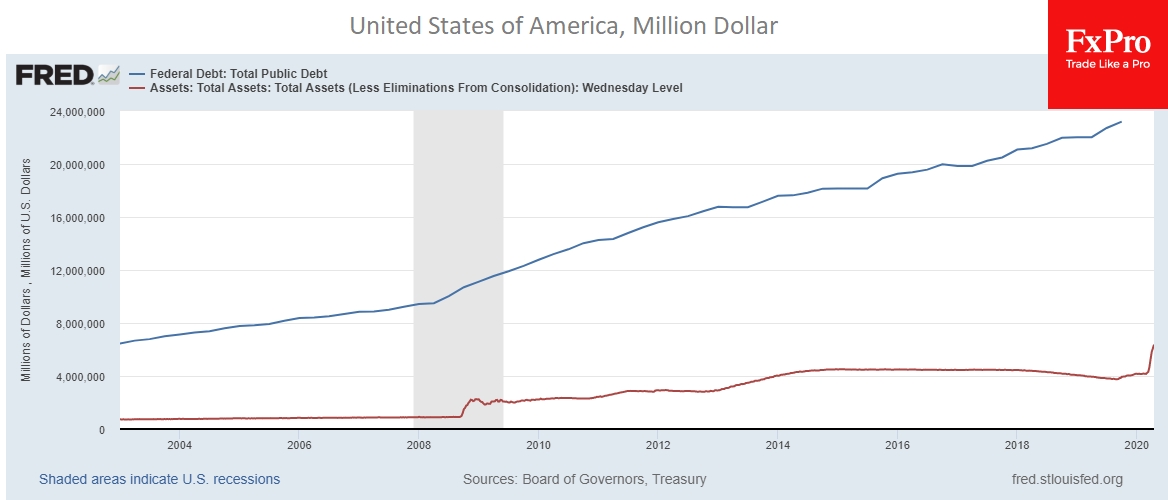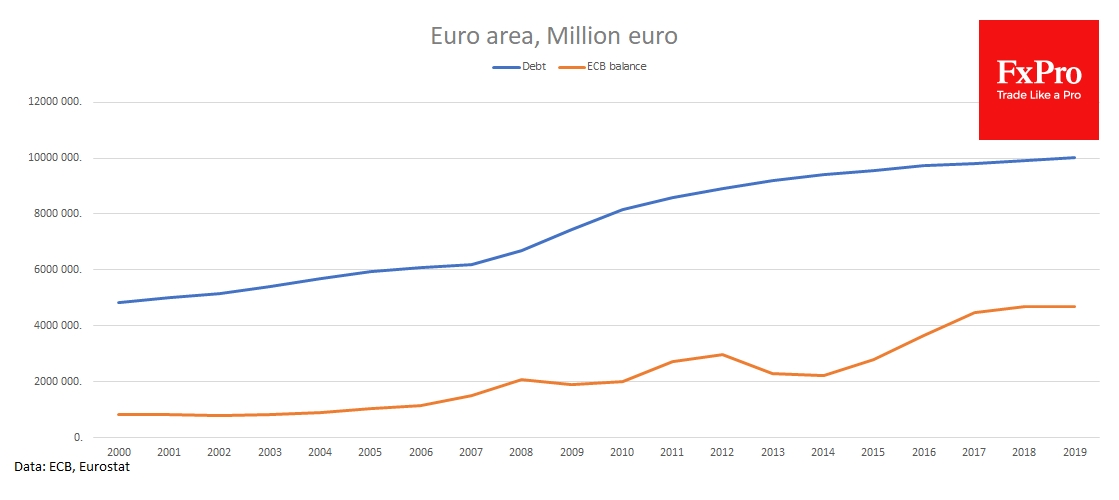World markets are demonstrating cautious growth, caused by hopes for a third support package coupled with easing of restrictions in the economy. Oil turned to growth yesterday on geopolitics and rebounded after extreme oversell. Attention to oil clearly showed how fast politicians reacted. The Fed is sharply and decisively building up the balance sheet, starting much earlier than when the first signs of problems in the economy appeared. The U.S. government, having forgotten all the partisan conflicts, is agreeing on stimulus packages, the total volume of which is already approaching $3 trillion.
The situation in Europe and Asia is very similar: huge support packages, assistance to debt markets from the central bank.
The government gives out money, continuing to accumulate debts. If even before the virus story, the financial world was wary of the growth of government and corporate debts, now they have to note an explosive increase in liabilities. We should add to this a sharp drop in budget revenues due to downtime in the economy, and the picture becomes dangerous to even the most wealthy borrowers.
How will governments reduce their burden in the future? Two options come to mind – sturdy and soft.
The severe scenario implies first restrictions on the buyback of stocks by companies and increased attention to dividends and bonuses to the management of affected companies. These measures will not be enough so that the situation may turn into a sharp increase in taxes on high income and even a cut of deposits in favour of the government.
At the country level, the IMF may become the centre of negotiations on a deep restructuring of external public debt not only for weak developing economies but also for developed ones. After 2009, most of them have increased their public debt. They were helped only by zero interest rates from the central bank, which made it cheaper to service government debt. However, few managed to reduce it even with long-term minimum unemployment.
The soft scenario suggests fewer restrictions and restructuring but promises to be equally burdensome for people with savings. Inflation is a tax on capital that is gradually eroding its value. Inflation will likely accelerate much faster this time than it did 12 years ago. This time the money directly goes to those who spend it immediately: the households and small businesses.
Central banks, however, are unlikely to be in a hurry to suppress signs of accelerated price growth. People who have no savings will benefit from this situation, as long as they are able to index their wages to inflation regularly.
Almost certainly, we will see a combination of parameters from both scenarios, some won’t be used, and others will appear. This is what now looks logical in these conditions. However, this is a favorable scenario for stock markets in general. Often during global economic turmoil, leaders are renewed, and previous whales go into oblivion.
However, this promises difficult times for the currency market, where the status of traditional safe-havens will be questioned – the debt markets of Japan, the United States, and Europe. As we saw in 2011, investors can get rid of the debt securities of reliable countries, if they are afraid of problems with their maintenance and raising new funds. And with the zero interest rates, central banks have nowhere else to retreat but to increase their balance sheets.
The FxPro Analyst Team
- English (UK)
- English (India)
- English (Canada)
- English (Australia)
- English (South Africa)
- English (Philippines)
- English (Nigeria)
- Deutsch
- Español (España)
- Español (México)
- Français
- Italiano
- Nederlands
- Português (Portugal)
- Polski
- Português (Brasil)
- Русский
- Türkçe
- العربية
- Ελληνικά
- Svenska
- Suomi
- עברית
- 日本語
- 한국어
- 简体中文
- 繁體中文
- Bahasa Indonesia
- Bahasa Melayu
- ไทย
- Tiếng Việt
- हिंदी
Governments Pay For The Recovery, But Who Will Help Them After? Two Scenarios
Published 04/23/2020, 05:40 AM
Updated 03/21/2024, 07:45 AM
Governments Pay For The Recovery, But Who Will Help Them After? Two Scenarios
3rd party Ad. Not an offer or recommendation by Investing.com. See disclosure here or
remove ads
.
Latest comments
Install Our App
Risk Disclosure: Trading in financial instruments and/or cryptocurrencies involves high risks including the risk of losing some, or all, of your investment amount, and may not be suitable for all investors. Prices of cryptocurrencies are extremely volatile and may be affected by external factors such as financial, regulatory or political events. Trading on margin increases the financial risks.
Before deciding to trade in financial instrument or cryptocurrencies you should be fully informed of the risks and costs associated with trading the financial markets, carefully consider your investment objectives, level of experience, and risk appetite, and seek professional advice where needed.
Fusion Media would like to remind you that the data contained in this website is not necessarily real-time nor accurate. The data and prices on the website are not necessarily provided by any market or exchange, but may be provided by market makers, and so prices may not be accurate and may differ from the actual price at any given market, meaning prices are indicative and not appropriate for trading purposes. Fusion Media and any provider of the data contained in this website will not accept liability for any loss or damage as a result of your trading, or your reliance on the information contained within this website.
It is prohibited to use, store, reproduce, display, modify, transmit or distribute the data contained in this website without the explicit prior written permission of Fusion Media and/or the data provider. All intellectual property rights are reserved by the providers and/or the exchange providing the data contained in this website.
Fusion Media may be compensated by the advertisers that appear on the website, based on your interaction with the advertisements or advertisers.
Before deciding to trade in financial instrument or cryptocurrencies you should be fully informed of the risks and costs associated with trading the financial markets, carefully consider your investment objectives, level of experience, and risk appetite, and seek professional advice where needed.
Fusion Media would like to remind you that the data contained in this website is not necessarily real-time nor accurate. The data and prices on the website are not necessarily provided by any market or exchange, but may be provided by market makers, and so prices may not be accurate and may differ from the actual price at any given market, meaning prices are indicative and not appropriate for trading purposes. Fusion Media and any provider of the data contained in this website will not accept liability for any loss or damage as a result of your trading, or your reliance on the information contained within this website.
It is prohibited to use, store, reproduce, display, modify, transmit or distribute the data contained in this website without the explicit prior written permission of Fusion Media and/or the data provider. All intellectual property rights are reserved by the providers and/or the exchange providing the data contained in this website.
Fusion Media may be compensated by the advertisers that appear on the website, based on your interaction with the advertisements or advertisers.
© 2007-2024 - Fusion Media Limited. All Rights Reserved.
